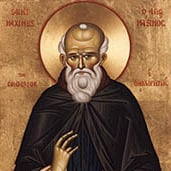Regina Caeli – Queen of Heaven, Rejoice!
The Regina Caeli, Latin for “Queen of Heaven,” is a hymn and prayer ...

St. Maximus the Confessor was born into a noble family of the imperial city of Constantinople in 580 AD. While serving as secretary to the Byzantine Emperor Heraclius, Maximus heard the call to the religious life and abandoned civil service to enter a monastery in Chrysopolis, opposite Constantinople where he eventually became abbot. St. Sophronius, a monk who later became patriarch of Jerusalem, had a great influence upon him through personal contact and perhaps his writings. In the days of Maximus, the Christian Empire of Byzantium was divided by the Monophysite heresy, which refused to confess Jesus Christ as possessing two full natures, one human, the other divine. This had terrible political and military consequences for the Empire as well as sad consequences for the Church. All of Egypt, Ethiopia, Armenia and parts of Syria were alienated from both the Catholic Church and the Empire which was its defender. There was therefore great political as well as authentically apostolic motivation to heal the schism and restore the empire’s unity. One solution proposed was to agree that Jesus had two natures, but only one will. Maximus and many saw this as disguised Monophysitism, since a human will is an essential part of a complete human nature. The emperor, desiring peace at any cost, promoted this “one will” approach, called Monothelitism, and had it expressed in a document called the “Typos” which he urged all parties to sign. Maximus ardently and publicly opposed the Typos, writing and speaking eloquently in favor of the full humanity of Christ, and finding support in this from Rome where he lived for a while. He ultimately returned to Constantinople to bear witness to the true faith of the Church in the full humanity and divinity of Christ. He and many of his companions were brought to trial in 662 and sentence to have their right hands chopped off and tongues cut out before being sent into lifetime exile where Maximus, weakened by his ordeal, died just a few month later. He is called “the Confessor” because he was tortured and imprisoned for his confession of the orthodox, Catholic faith in Christ, true God and true man. Besides his writings against the Monophysites and Monothelites, Maximus left us many works of spiritual and ascetical theology, especially his commentary on the Lord’s prayer and Psalm 59, that have been continually prized by the Eastern and Western Church alike. His “Mystagogia” helps us understand how the liturgy and sacraments were celebrated and understood in his time, and his mystical “Scholia” on Pseudo-Dionysius are still of great interest to scholars and monks. Because of the depth of his spiritual and doctrinal understanding, St. Maximus the Confessor is one of the few writers in the history of the Church who is also known as “the Theologian.” Biography by Dr. Italy